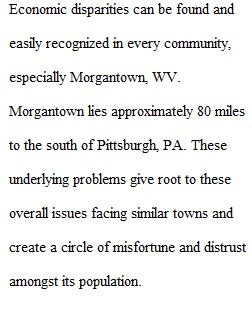


Q Your team represents local government and as such, you promote multiple interests that serve the greater public good: law, order and public safety; a transportation infrastructure; public utilities; disaster preparedness; public education; a “safety net” of social services; conditions that promote economic development and vitality; and effective citizenship that upholds democratic ideals. As a local government entity, you have the ability to raise revenues through taxes. You also can deficit spend. Because you are accountable to the citizenry for the way you govern, the decisions you make in Round 1 will be made visible to the business and community teams at the beginning of Round 2; their Round 1 decisions will not be revealed to you, however. You also serve as a liaison with state and federal agencies and in some cases coordinate the appropriation of resources from multiple sources to address local needs. The decisions you make will impact – either directly or indirectly – every individual and organization in the region, not to mention the physical environment and natural resources. Changes in your allocation of resources should carefully weigh short-term impacts and long-term consequences, the self-sufficiency of the town with its integration into a larger region and disparate impacts (positive and negative) on individuals and families, minorities and other vulnerable segments of the population, as well as businesses and not-for-profit organizations. Unlike the business and community groups, the government can borrow money to meet its spending priorities. Just be sure that these monies are earmarked mostly towards capital expenditures rather than just to meet general operating expenses.
View Related Questions